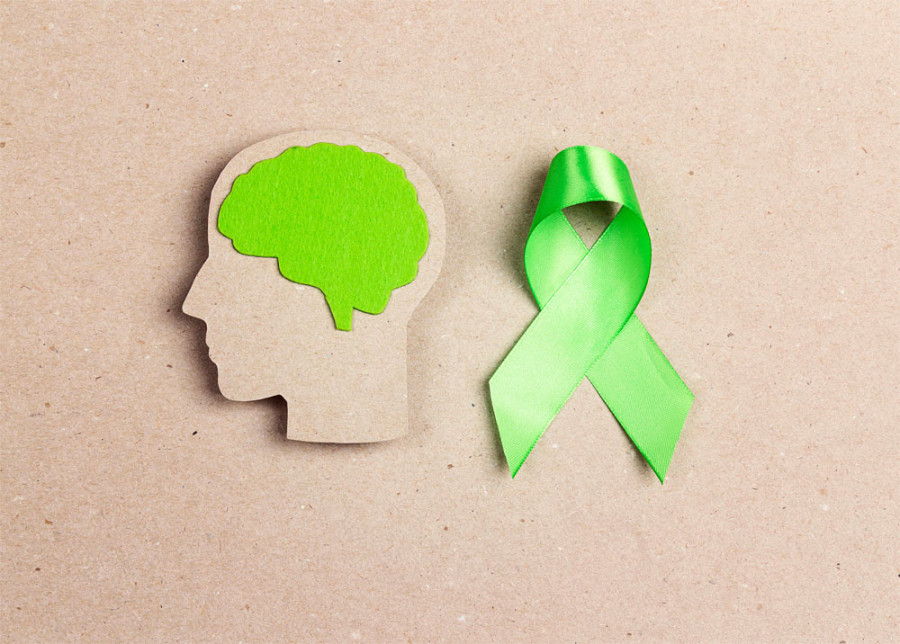Health
Stigma towards mental health remains a barrier to accessing care
A new government nationwide study finds that a whopping 94 percent of people with mental health issues never visit a specialist for help.
Samiksha Baral
After skipping more than 20 classes last November, Shikshit Adhikari realised something was not right with him.
Adhikari, a second-year medical student at Kathmandu University School of Medical Sciences in Dhulikhel, Kavre, was once a class topper, but as missing classes continued, he started getting low grades and lost interest in study. He lost a lot of weight too.
“I would feel like I was being choked. I had started spending time in a dark room, struggling alone,” said Adhikari. “Taking classes depressed me more and made me anxious. I knew that was not normal.”
After nearly two months of suffering alone, Adhikari realised he needed help from others. In late December, he travelled to his hometown, Biratnagar, to be with his family. He also decided to visit a psychiatrist.
“The hardest part was not that I realised I needed some mental health treatment,” said Adhikari. “The bigger and scarier aspect was how I would even approach my family.” The 21-year-old thought it would not be easy to talk about his condition.
Fortunately for him, the conversation was not as awkward as Adhikari had thought it would be.
In January, the Adhikari family decided to take him to Tribhuvan University Teaching Hospital in Kathmandu to see a psychiatrist.
“I never thought my parents would react in that way. That was something pleasantly surprising,” said Adhikari. “I have often heard people in my hometown talking of someone who has mental health issues in a humiliating way. In such situations, it’s not only the person dealing with the condition; the whole family suffers.”
Adhikari considers himself lucky that he could identify his issues, approach his parents and could get the timely treatment before things could have gone worse.
While Adhikari could get medical attention, a shocking 94 percent of people with mental illnesses never reach and consult with a psychiatrist, according to a study released last month by the National Health Research Council, the government body for promoting health research across the country.
A vast majority of people with mental illnesses refrain from seeking any kind of help and thus remain deprived of mental health care.
According to Meghnath Dhimal, senior research officer at the Council, there are multiple reasons why people avoid mental health treatment.
“The main reason is the lack of awareness and the prevailing attitude towards mental health,” Dhimal, who was also one of the members of the study team, told the Post. “Our country is still living in the belief that prayers and performing rituals can help in dealing with mental disorders.”
According to Dhimal, the survey was conducted to assess the prevalence of mental health issues in the country and to find out the help seeking behaviour and the barriers to accessing care among people with mental problems in Nepal.
The National Mental Health Survey, Nepal 2020, conducted among 15,008 individuals—5,888 adolescents, aged 13 to 17 years, and 9,200 were adults aged 18 years and above—found out that among the adults 10 percent had experienced mental disorders in their lifetimes and 4.3 percent were currently suffering from them.
The nationwide prevalence of suicidality, also known as suicidal thoughts or suicidal ideation, was found to be at 7.2 percent.
The nationwide survey, which was conducted in all seven provinces between January 2019 and January 2020, the prevalence of lifetime mental disorder was highest among adults in Province 1 at 13.9 percent—13.3 percent in the 40-49 years age group and 12.4 percent among males.
“However, the data on the extent of mental health issues was scarce in Province 2. It is not because general people do not have mental health issues; rather, the majority of people do not know what mental health is and they do not have anyone to share with as they believe in the associated stigma,” said Dhimal.
Despite such widespread prevalence of mental health issues, a large number of people were found to be suffering on their own without seeking any support—professional or non-professional. The study found out that 40 percent of the people had talked about their symptoms with someone, with 20.5 percent reaching out to their spouse and 22.4 percent to their other family members.
But the proportion remained pretty low when it came to seeking treatment as only 23 percent had sought help for their symptoms. The proportion reaching out for professional help was even lower.
While 8.8 percent of individuals visited non-specialist medical practitioners, 6.7 percent visited faith healers and only 6.5 percent reached out to psychiatrists for treatment. A meagre 0.2 percent and 0.3 percent of people also consulted psychologists and counsellors, respectively, according to the survey.
“Very few people visit hospitals for seeking mental health care and that is because of lack of awareness,” said Dr Ram Prasad Lamichhane, a psychiatrist at Lumbini Medical College in Palpa. “I think the government should not only focus on training health workers but raising awareness among the general public about mental health is also needed.”
Lack of awareness is not the sole factor in keeping the general public away from seeking health. Potential social stigma haunts families and individuals seeking medical treatment.
The survey also highlights that stigma around mental health, as well as the individual’s personal attitude towards the problem, as a major barrier since it affects their decision to seek treatment.
According to the survey, 23.5 percent of the adult participants with mental health issues reported ‘wanting to solve problems on their own’ and ‘thinking that the problem would get solved on its own’ for not seeking help.
A further 21.9 percent respondents did not even acknowledge they have a problem. Other attitudinal barriers keeping them away from medical treatment included being hospitalised against the will, preferring alternative care, thinking professional help wouldn’t help, side effects of medication, the discomfort of sharing their feelings and emotions.
Stigma related to barriers also influenced general public behaviours in getting professional health care. For 15.6 percent thought having a mental problem would make them appear weak, 12.3 percent were concerned about their parents’ feelings, 11.7 percent reported feeling embarrassed or ashamed. Another 10.5 percent were afraid to be seen as crazy and 9.7 percent were worried people would not take them seriously.
The government over the years has been criticised for neglecting the mental health sector. But, recent studies like this latest survey have once pointed out the urgency of the issue.
“In western countries, on the basis of various researches governments conduct various stigma related awareness [campaigns],” said Dr Basudev Karki, a consultant psychiatrist at the Patan Mental Hospital, Lalitpur. “In Nepal, too, although such activities have been carried out since 2014 all these barriers cannot be reduced soon. There have been improvements, but it is a long process. It takes years to see the results.”
“An action plan has already been made to address the issues of adolescents and adults from various rural areas.”
But, Dr Karki also pointed out, health posts in Nepal are not equipped for patients with a mental disability. An estimated 2.2 million people suffer from mental health disorders in Nepal. The country has only 0.58 beds per 100,000 to serve people with mental illnesses in various hospitals.
Meanwhile, Adhikari is not a night owl anymore. Adhikari’s daily routine has returned to normal—studying, eating and sleeping on time, hanging out with friends and aspiring to do well in his study to become a doctor, if possible a psychiatrist.
“I hope that everyone comes to the term that even they can have mental health issues and there is nothing to be ashamed of,” said Adhikari. “Families do accept and help with treatment. I wish everyone gets to consult with a psychiatrist. It does help.”
The Tribhuvan University Teaching Hospital suicide hotline (9840021600) and Patan Hospital crisis helpline for suicide prevention (9813476123) operate 24 hours. The Transcultural Psychosocial Organization (16600102005) provides helpline services between Monday and Friday from 9:30 am to 4:30 pm.




 22.65°C Kathmandu
22.65°C Kathmandu














